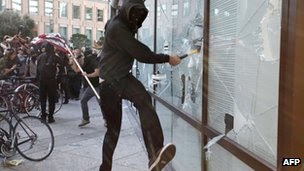The Occupy Wall Street movement was the first to reach media publicity, and after that other 'Occupy' protests and marches followed.
 For us in the Chicagoland area know the of the Occupy Chicago protest, one which held the same basic values of the Occupy Wall Street, and kept the same non-violence as its predecessor. Up until now, I have no problem with this kind of act. It is for the most part legal, people voicing their oppinion, and while I personally think that their demands and intentions are very hazy and poorly operated, I must still respect their actions. However, recent Occupy Oakland events have me startle. As I read in this BBC Article , what started as a fairly peaceful 'Occupy' initiative turned into what I would consider a full on riot.
For us in the Chicagoland area know the of the Occupy Chicago protest, one which held the same basic values of the Occupy Wall Street, and kept the same non-violence as its predecessor. Up until now, I have no problem with this kind of act. It is for the most part legal, people voicing their oppinion, and while I personally think that their demands and intentions are very hazy and poorly operated, I must still respect their actions. However, recent Occupy Oakland events have me startle. As I read in this BBC Article , what started as a fairly peaceful 'Occupy' initiative turned into what I would consider a full on riot.
As the article reports, "Protests on Wednesday were largely peaceful until around midnight local time, when some of the protesters reportedly set a barricade on fire."
 However, the protesters did not stop there, BBC quoted reports the police saying they gave the order to fire tear gas and bean bags "following repeated orders for the crowd to disperse" and in the face of "continued assaults by rocks, lit flares, roman candles and bottles" While no formal number was provided, the primary damage estimates were valued to be around one million. Also, human damages were also listed-around five protesters were hospitalized-including an Iraq War veteran.
However, the protesters did not stop there, BBC quoted reports the police saying they gave the order to fire tear gas and bean bags "following repeated orders for the crowd to disperse" and in the face of "continued assaults by rocks, lit flares, roman candles and bottles" While no formal number was provided, the primary damage estimates were valued to be around one million. Also, human damages were also listed-around five protesters were hospitalized-including an Iraq War veteran.
While many public officials were upset with the protest-turned-riot in Oakland, other members of the 99% movement said they, too, were disapointed. Comments like, "I think it will allow detractors to criticise the movement," and, "It's messing with our movement," are not far from earshot.
I'm all for freedom to assemble and right to free speech, but when people take and abuse these priviledges and use them to incite harm and violence, no matter what they are saying, I'm not sure if I could ever support something like this incident. What do you think? Is there any justification for these actions? Did they take it too far?
*Note* This was originally published in November. Reposted in addition to recent protest blog.